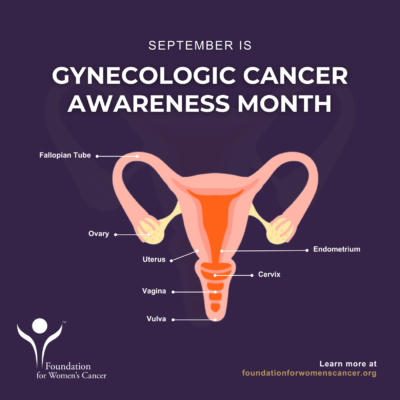Gynaecological Cancer Awareness Month

Gynaecological Cancer Awareness Month is observed in September to raise awareness about various gynaecological cancers, including cervical, ovarian, uterine, vaginal, and vulvar cancers
Symptoms of gynaecological cancer vary depending on the type of cancer. If you have any of the following symptoms, it is important to get them checked out by your GP.
Womb cancer
Usually, the first sign of womb concern is unusual vaginal bleeding. For example, this could be:
bleeding after the menopause (this is the most common symptom)
bleeding between periods
heavier period than usual (if you have not been through the menopause)
a bloody or pink and water vaginal discharge
Less common womb cancer symptoms are pain or discomfort in the pelvic area, or pain during sex.
If you have any unusual vaginal bleeding, always see your GP about it. Other conditions that affect the womb, such as fibroids, can also cause unusual vaginal bleeding.
Ovarian and fallopian tube cancer
The symptoms of ovarian cancer and fallopian tube cancer are similar to other much more common non-cancerous conditions. This can make it difficult to diagnose early.
Symptoms can include:
a persistent or long-lasting swollen tummy
pain in the back or lower tummy
peeing (passing urine) more often usual or feeling an urgency to pee
loss of appetite or feeling full quickly when you eat.
Cervical cancer
Very early-stage cervical cancer may not cause symptoms.
Common symptoms of cervical cancer include:
heavier periods than you normally have
vaginal bleeding between periods, after sex, or after menopause
If you have any of these symptoms between your regular cervical screening appointments, do not wait for your next appointment. Talk to your GP or practice nurse and get the symptoms checked.
Vaginal cancer
The most common symptoms of vaginal cancer are:
bleeding after menopause, between periods, or after sex
blood-stained vaginal discharge
pain when peeing (passing urine), needing to pee often, or blood in your pee
pain the pelvic (lower tummy) area
constipation
feeling you need to poo, even though you have just been
swelling in your legs.
Vulval cancer
Symptoms of vulval cancer can include:
a lump, swelling or wart-like growth on the vulva
itching, burning or soreness of the vulva that does not go away
burning when passing urine (pee)
bleeding, or a blood-stained vaginal discharge, that is not related to periods.
